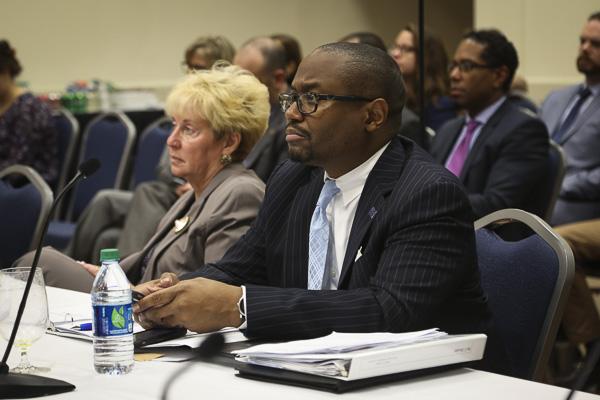Officials plan for the largest fundraising campaign in University history to reach its $1 billion goal a year ahead of schedule.
The campaign, which publicly launched in June 2014, was slated to finish in June 2018 – but having already raked in $894 million, officials expect to hit the goal by the end of University President Steven Knapp’s tenure in June. The campaign won’t end then: GW’s top fundraiser said he and others will focus on promoting specific causes, like student aid, to keep raising money during the final year of the campaign.
This new goal date was first revealed in the presidential profile, a document that outlines expectations for the University’s 11th president.
“The University has used its hard-won prominence to raise funds and is expected to complete a $1 billion comprehensive campaign in 2017 during the current president’s tenure,” according to the profile.
The campaign has already raised about $894 million, according to its website.
Aristide Collins, the vice president for development and alumni relations, said the fundraising office will continue to raise money for the campaign after the $1 billion goal is met. Collins said in an email that his staff is engaged in conversations with donors about gifts that will help the University cross the campaign threshold, but that he cannot yet provide details about those discussions.
More than 61,000 donors have contributed to the campaign so far, and he is encouraged by their commitment to fundraising, Collins said.
“Reaching the $1 billion goal will mark a tremendous achievement for GW, and I am confident that the momentum will continue,” Collins said. “These donors have found people and programs at GW that are worthy of their philanthropic support, and we are working hard to demonstrate to our supporters that we are good stewards of their philanthropy.”
Development officials said earlier this year that the next phase of the campaign will be focused on raising money for student aid. Collins said that between now and the close of the campaign, officials will prioritize the campaign’s “support students” pillar, which accounts for 16 percent of the funds raised so far, according to the website.
University President Steven Knapp said that he will continue to travel internationally to nail down donations during his final year.
“We are within striking distance, so that means trying to have conversations with a lot of people that we’ve already been working with to see if we could call the question on some of the gifts that are pending,” Knapp said. “I may end up going back to the U.K., we just have to see what makes sense in terms of where people are that I’m trying to engage in our conversations about the campaign.”
Throughout his tenure, Knapp has traveled outside the country to places like London and Istanbul to connect with alumni and potential donors.
Completing a campaign at the end of the University president’s tenure should encourage donors to give during the final phase, experts said.
Shaun Keister, the vice chancellor of development and alumni relations at the University of California, Davis, said the timing for GW to finish the campaign before the end of Knapp’s presidency is “ideal” for candidates who want to create their own fundraising plans.
“If I were a candidate and viewed fundraising as a top priority of my presidency, I would actually view the ability to shape my own as a positive,” Keister said. “It doesn’t always work out that way, that the campaign can end and a president can put it in their list of accomplishments and the new president can sort of forge their own path.”
Students, faculty and staff said during town hall meetings last month that they want the next University president to prioritize fundraising.
B.J. Davisson, the chief development officer and senior vice president of development at the West Virginia University Foundation, said that reaching a campaign goal early can create momentum for the final phase of the campaign. Davisson served as the senior associate vice president for development under GW’s last fundraising chief, Mike Morsberger.
“A major benefit of reaching the goal early is the positive publicity and awareness it generates for not just the campaign, but the institution as a whole,” Davisson said in an email.
Some donors may not think a campaign is over when it’s completed early, but officials can combat that by focusing on individual schools’ goals that haven’t been reached and by increasing publicity, Davisson said.







